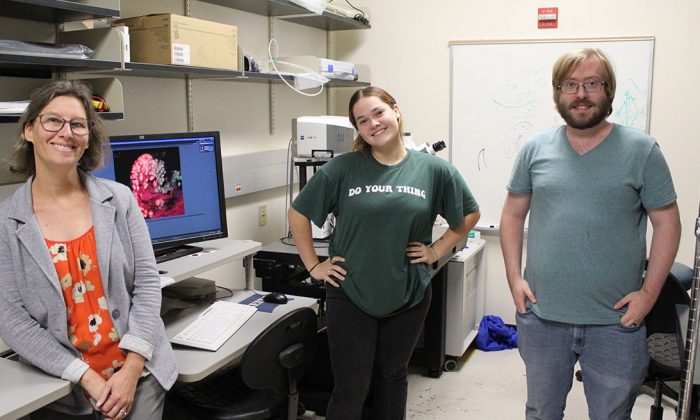UTSA Libraries staff are working to help researchers comply with a new requirement for publishing federally funded research.
By the end of this year, UTSA faculty and graduate students must make the results of their federally funded research publicly available immediately upon publication, ending the longstanding 12-month embargo period.
The change was announced by federal agencies, including the National Institutes of Health (NIH), the National Science Foundation (NSF) and the Department of Education, and created a new sense of urgency for researchers to understand the requirements. Failure to comply could jeopardize future funding.
To help the campus prepare, UTSA Libraries and Museums’ Emily Hayward, scholarly communications librarian, and Rachel Davis, research data services librarian, have reviewed funder policies, tracked publisher responses and worked to ensure UTSA researchers remain compliant.
“Changes are happening quickly, and we’re working hard to keep the campus informed about how this could affect our researchers,” Hayward said. “We’re tracking not only new policies from agencies such as the NIH and NSF, but also how major publishers like Wiley and Elsevier are responding.”
To assist faculty and graduate students, UTSA Libraries is collaborating with the UTSA Office of Research to offer guidance and training. Librarians are available to answer questions and connect researchers with compliance tools.
“The library staff guided me through the process and ensured I was in compliance. Their support gave me peace of mind and allowed me to focus on the research itself.” — Hannah MacNaul
“Our partnership with UTSA Libraries has been invaluable as we prepare the campus for these new federal requirements,” said Jennifer Silver, senior director, UTSA Office of Sponsored Projects. “Emily and Rachel bring expertise that is critical for helping our researchers and graduate students stay compliant. Their proactive work is ensuring that UTSA scholars can focus on their research while navigating a rapidly changing publishing landscape.”
UTSA researchers can fulfill the requirements in various ways, such as publishing in an open-access journal or depositing accepted manuscripts in designated repositories like PubMed Central or UTSA’s Runner Research Press. UTSA also has agreements with many publishers that enable authors to publish open access for free.
Faculty and graduate students say they are already relying on this support.
“I wanted help navigating the Department of Education’s public access requirements,” said Hannah MacNaul, assistant professor in the UTSA College of Education and Human Development. “The library staff guided me through the process and ensured I was in compliance. Their support gave me peace of mind and allowed me to focus on the research itself.”
UTSA Libraries also offers workshops on topics such as federal public access policy changes, how to conduct searches on PubMed, and accessing publishing discounts available to UTSA researchers. These sessions provide practical, hands-on support for faculty and graduate students navigating a rapidly changing research environment.
“We partner with researchers to create strong data management plans, select the best repositories and navigate agency-specific mandates,” Davis said. “Our role is to take the guesswork out of compliance and provide ongoing support throughout the research process.”



